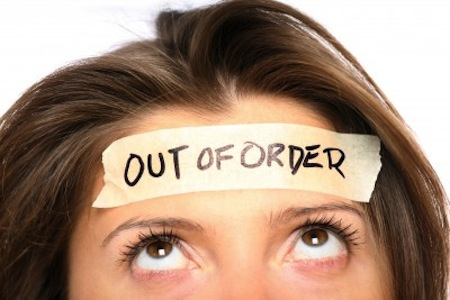If your job feels overwhelming and it is getting hard to focus, you may be feeling burned out.

Common signs of burnout include: A loss of enthusiasm for your job, less interest in your social life, and a weakened ability to focus. Sound familiar?
Burnout is not an imaginary condition that’s all in your mind. It’s a very real mental and physiological condition caused by a stress overload. Burnout hits when we are overworked, overtaxed emotionally, or physically exhausted. The immediate result is difficult coping with our everyday stress.
Many executives and entrepreneurs claim they thrive on stress. But what they are enjoying is the physiological stimulation of an adrenalin high. But adrenalin highs only prepare your body and mind to either fight or run. They do not lead to clear thinking, and are a key part of the stress response.
During an adrenalin high your brain’s higher thinking centers close down. Older, more primitive, portions of your brain take over to prepare you for an emergency. Over time this leads to mental and physical exhaustion. And if you think you are immune, you are seriously kidding yourself.
The Stages of Burnout

A stress overload occurs when the demands being placed on you exceed your ability to meet them. The major factors may include: Time pressures, excessive responsibility or accountability, lack of adequate support, or overly high expectations by yourself or those around you. Burnout builds up over time, but you can take steps along the way to stop it.
The three stages of burnout include: The initial stress arousal stage, the low energy stage, and the exhaustion stage.
The Stress Arousal Stage
You are experiencing the early burnout stage if you feel irritable, anxious or forgetful, or are having difficulty with your mental focus. Some of the common signs of early burnout include: Flare-ups of high blood pressure, bruxism (grinding teeth during sleep), insomnia, headaches, and acute gastrointestinal distress.
The Low Energy Stage
As your stress becomes more and more chronic, your body tries to compensate for your growing mental and physical exhaustion. The feeling of low energy so common with chronic stress is a sign your body is trying to compensate for exhaustion by shifting into an energy conservation mode.
Behavior consequences often include: Forgetfulness, serious inability to focus, a tendency to procrastinate, excessive time off from work, lack of interest in your work or business, loss of hope and enthusiasm, decreased desire for intimacy, and a persistent feeling of tiredness or exhaustion.

Other common signs include: Social withdrawal from friends and family, cynicism, resentment, apathy and increased use of nicotine, caffeine, alcohol or prescription drugs.
The Acute Exhaustion Stage
The acute exhaustion stage is where most people finally get a clear sense that something is seriously wrong. The signs of acute stress-related exhaustion often include: Chronic sadness or depression, chronic stomach or bowel problems, chronic mental fatigue, chronic physical fatigue, chronic headaches or migraines, difficulty reading or understanding communications, and almost total inability to focus.
Other common signs may include: A desire to drop out of society, quit work, or abandon one’s business or profession — and the desire to avoid family, friends, and social situations.
Avoiding Burnout
The sooner you recognize you are suffering from burnout, the better you can introduce some remedies. Begin by asking yourself if you feel the demands being placed on you truly DO exceed your ability to meet them.
Then review the potential causes of your burnout: Are the time pressures being placed on you unrealistic? Do you feel you have more responsibility or accountability than you can handle? Do you have adequate support? Are you, or someone else, placing overly high expectations on you?

Be honest with yourself. The better your analysis, the more likely you will find a solution. If you cannot resolve the problem with your direct supervisor at work, you will have to create your own solution. Multi-tasking, for example, really produces less results. Perhaps look for ways to divide your work time into blocks of time dedicated to one specific task. Reward yourself with brief 10 or even 5 minute breaks and take a short walk to escape your desk.
A Fast Solution
I have a training program that will put you on top of this whole issue very fast Click here to get a grip!
